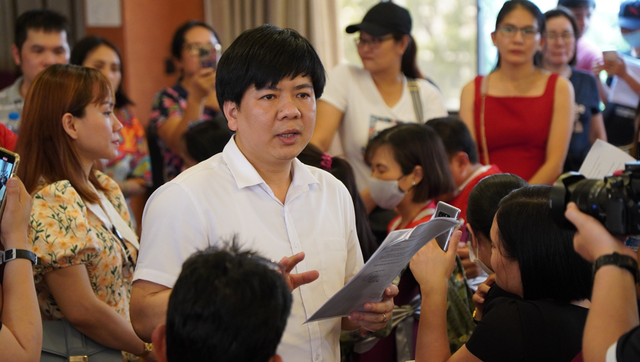THINGS THAT NEED TO BE CLEARLY DEFINED
Lawyer Nguyen Thanh Huan, Director of Law Firm 11, affirmed that the issue here is not a legal loophole but rather a problem in the enforcement of the law.
To encourage, mobilize, and facilitate the participation of organizations and individuals in the socialization of education , the State has clearly defined its role in protecting the legitimate rights and interests of organizations and individuals investing in education within the Education Law itself. Therefore, the legal system in general, and the Education Law in particular, is quite comprehensive in regulating this field.
However, the Director of Law Firm 11 argues that it is necessary to clearly define that investment in education is the direct contribution of resources to establish educational institutions or the investment in establishing economic organizations as stipulated by the Investment Law and the Enterprise Law. This is completely different from lending to educational institutions or economic organizations that own educational institutions.

Former General Director of Apax Leaders, Nguyen Ngoc Thuy, at the first in-person meeting with parents in Ho Chi Minh City in March 2023.
In other words, parents at AISVN International School accepted the school's fundraising agreement but did not intend to own a stake in the school's capital, nor did they participate as shareholders to monitor the investment. Therefore, this cannot be considered an investment in education. Furthermore, it is necessary to clearly distinguish whether the funds transferred by AISVN parents to the school were tuition advance payments or loans.
If the tuition fee is paid in advance, the school must manage and use this money in accordance with the regulations of the Education Law on tuition fees, and must also publicly disclose its finances, subject to inspection and supervision by management agencies. Therefore, if tuition fees are misused, leading to insolvency, or if there is a lack of transparency or honesty in reporting to evade inspection, the school will be subject to corresponding sanctions.
If it's a loan, then it's a civil agreement, and the school is responsible for using the money for the purpose agreed upon. Misuse of funds, leading to inability to repay, will result in legal consequences.
By entrusting money to others, one inherently accepts risk, but investing to become a shareholder allows for more effective oversight. At the very least, shareholders also simultaneously own the assets and brand of the school corresponding to their capital contribution.

Students at AISVN International School return to school after a break due to the absence of teachers.
REGULATIONS ON CONTROLLING INVESTMENTS BY EDUCATIONAL INSTITUTIONS
Lawyer Nguyen Van Thai, Director of Nam Thai International Law Firm, Hanoi Bar Association, stated that the collection of tuition fees for all levels and types of education, including foreign language centers like Apax Leaders, is regulated by Government Decree 81. Furthermore, the operation of foreign language centers is also regulated by Circular 21 of the Ministry of Education and Training, but it does not detail the issue of tuition fees.
"Therefore, regarding tuition fee collection, the unified regulatory document is Decree 81. Based on Article 12 of this document, it can be understood that the centers' collection of lump-sum tuition fees is still in accordance with the law," lawyer Thai commented.
Dr. Nguyen Hong Thai, Director of Hong Thai International Law Firm and Colleagues, Hanoi Bar Association, agrees that paying tuition fees in one lump sum at the beginning of the course is a civil agreement between the two parties and does not violate any legal regulations.
Also related to the issue of tuition fees, according to Mr. Hong Thai, currently there are only documents mentioning how domestic and foreign organizations invest in education, such as Decree 46/2017/ND-CP, Decree 86/2018/ND-CP, and Decree 81/2021/ND-CP amended by Decree 97/2023/ND-CP, but there is no clear, official legal framework regulating how educational organizations use tuition fee revenue to invest in other areas.
This loophole allows educational institutions, especially those in the private sector, to invest freely without any restrictions. This situation is completely different from the banking and insurance sectors, which also use customer funds for investment but must comply with regulations such as the Insurance Business Law, Mr. Thai cited as an example.
"Essentially, this activity has two sides. If tuition fees are used for profitable investments and then those profits are reinvested in developing training programs and facilities, it is very commendable. However, there are also cases where businesses incur losses, affecting students. Therefore, instead of prohibiting it, we should minimize risks by adding regulations to control the investments of educational institutions," Mr. Thai noted.
Source link







![[Photo] Prime Minister Pham Minh Chinh working with the Vietnam Academy of Science and Technology](https://vphoto.vietnam.vn/thumb/1200x675/vietnam/resource/IMAGE/2026/02/23/1771832245861_image-2-6431-jpg.webp)































![[Photo] Nhan Dan Newspaper's New Year's gathering in the year of the Horse 2026](https://vphoto.vietnam.vn/thumb/1200x675/vietnam/resource/IMAGE/2026/02/23/1771825639110_gap-mat-dau-xuan1-8272-jpg.webp)













































































Comment (0)